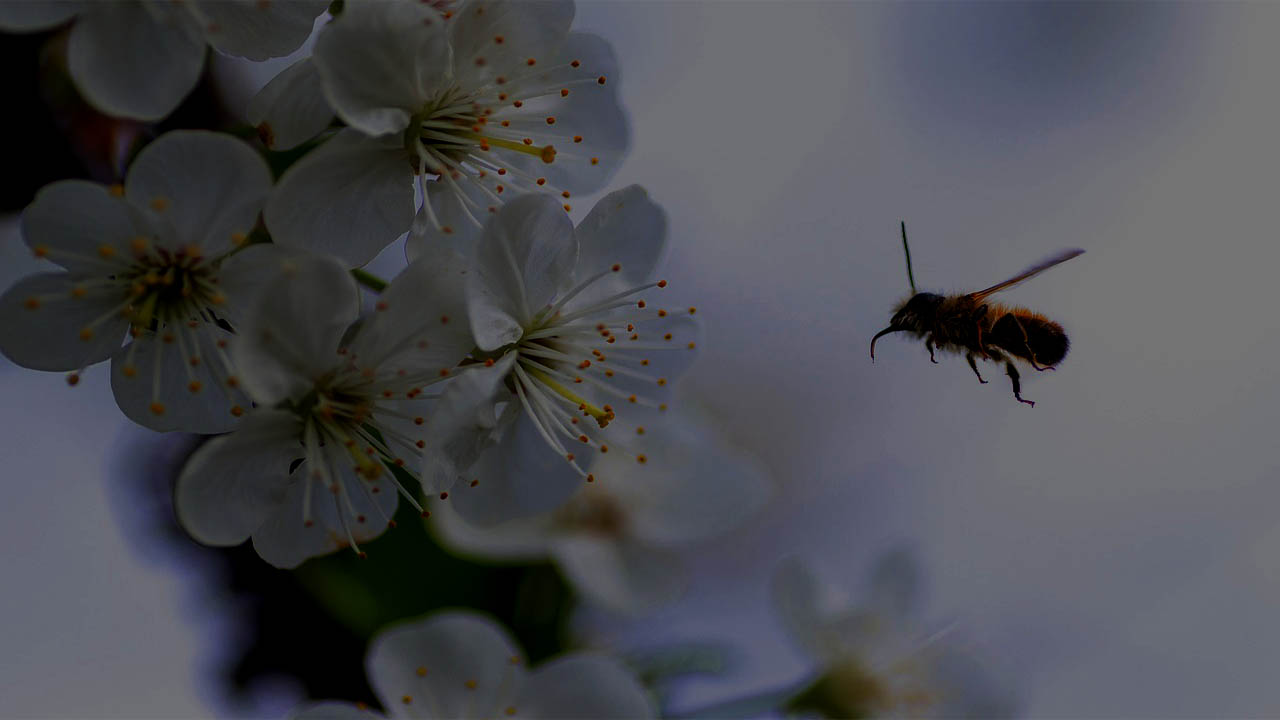

Bees are generally docile and keep to themselves. However, in the face of any threat to them or their colony, they will retaliate.
So, do bee attack at night? Yes, they can attack at night if they are threatened. So, it’s better to be careful if there is a bee hive nearby. Some bees are more aggressive compared to others. They have more chances of attacking you compared to the ones that are not so aggressive.
Some Myths About Bees!
All bees sting:This is untrue since male bees cannot sting. The stinger is an extended egg-laying device, which is found only in the female bees. There are examples of certain female types who cannot sting. Also, bees don’t sting everyone until provoked or find their colony under threat.
Bees can repeatedly sting:When a bee stings their prey, this extended stinger gets lodged in the thick skin as in humans. Since they are unable to retract their stinger, they leave it behind along with some parts of their abdomen and digestive tract. Due to this wound, the bee dies soon after. Hence, bees can’t sting repeatedly.
Bees and wasps are similar:Bees and wasps are from the same insect order, known as the Hymenopterans. But, their similarity ends there. Bees are purely vegetarian. Wasps feed on other insects and pests. Bees are busy collecting nectar and pollen for their young ones. Wasps keep themselves active scouring for food, including bees. Bees are generally not aggressive until they feel threatened. Wasps attack you if their nest is under seize and chase you for a considerable distance, before giving up! Bees die immediately after a sting since they are unable to retract their stinger. Wasps have a smaller and smooth stinger, which gets removed after each sting, which helps them to sting repeatedly. Bees are smaller in size compared to wasps. They are also stout compared to wasp’s slender body and legs.
By spraying water over the beehive, bees will not sting: This is not true since spraying water on the hive does not affect the bees in any way. This gets considered as a threat for the female worker bees to attack you.
Bees produce honey:Only about five percent of the bees species produce honey! Honey bee and stingless bees contribute to this production. Bumblebees produce a minimal quantity of honey since they have an annual lifecycle and stores only that required amount.
All bees work hard:Only the female workers of the honey bee, stingless bee, and bumblebee work very hard during their lifespan. The male bees hardly work at all. Some female species of solitary bees work for some time.
Adult bees live long:Solitary bees live only for a few weeks – just enough time to build a nest, mate, and produce young ones. The female workers, males of honey, and bumblebees live around six weeks. The queen of bumblebee lives around one year, whereas, the honey bee queen survives up to four years.
Bees don’t sting at night:Bees sting at all times, including in the cover of darkness. They will only hurt you if they feel threatened.
All bees live in hives:Only ten percent of bees species, who are engaged in honey making, live in colonies. Other solitary bees live in nests made on trees or in the ground.
Absence of flowers will keep bees away:Bees live in hives, which could be very far away from nectar sapping and pollinating plants. If the bee scout finds a good location for a beehive, which could be devoid of flowers and plants, the swarm would settle there quickly and build their new colony.
Sealing a nesting area would kill the bees:Bees can bore thro’ wood and drywall. By sealing the nesting area, you are driving the bees further into your habitable space. It’s prudent to call the bee experts, than agitating the bees.
How Would You Come Across Bees At Night?
 Bees, like humans, are at their home after sundown. If the temperature drops and very cold, all the bees, including the workers, would go deep into their hives to keep themselves warm. In case the temperature is humid and hot, you would find most of the bees near the entrance to their hives, ventilating themselves and their homes.
Bees, like humans, are at their home after sundown. If the temperature drops and very cold, all the bees, including the workers, would go deep into their hives to keep themselves warm. In case the temperature is humid and hot, you would find most of the bees near the entrance to their hives, ventilating themselves and their homes.
Following are the ways, by which you come across bees at night:
Beekeeping:Those of you who are into beekeeping, should try and avoid getting close to their hives or inspecting the interiors.
Crepuscular and nocturnal:Those female bee workers and the scouts, who could see after sunset or before sunrise, are the ones you would come across at night. They are busy with their routine of collecting nectar and pollen or scouting for a new location for their hives.
Swarming:When these crepuscular and nocturnal bees decide to swarm to their new hive, you may come across them at night.
Phototaxis:Bees get attracted to any bright light due to their phototactic reaction — lights in front of your house, street light, in the garage, or the garden. If the bees have their hives nearby, they will come out to inspect this brightness!
Driving and hiking:If you are driving with your headlight on in wooded areas, which are prone to bee activity or colony, the brightness of the light can attract them. Also, while hiking in pitch darkness with an intense beam of torchlight, you are sure to attract the inquisitiveness of bees nearby, along with other insects.
Will Bees Attack At Night?
Bees are most docile insects, who are a boon to humankind across centuries. They are busy minding their own business. They would only attack if they feel threatened in any way or feel that their colony is in jeopardy.
Beekeeping: If you agitate the female workers by stepping too close to their hives, you would be attacked, whether day or night. Similarly, if you are inspecting the eggs or inside of the colony, you could be assured of a sting by the queen bee, who routinely stings the new developing queen bees in the darkness of the hive.
Crepuscular and nocturnal:If you come across the path of these working bees, you would probably be stung.
Swarming: Incase you stray into the swarming bees at night, and they feel threatened, you are sure to be attacked by thousands of them.
Phototaxis: If you provoke an inspecting bee, who has come out their hive to check out the harsh light, you will get attacked.
Driving and hiking:If you come close to the nesting spots of bees with your headlight or torchlight, and they feel agitated, they are sure to come out and inspect first. If they feel threatened, they could attack and sting the intruder.
Protection From Bee Attack At Night
You could resort to the following if you wish to avoid getting stung by bees at night:
- Always wear protective clothing, with sealed off joints, if you plan to inspect the beehive at night. The startled bees will get into attack mode if they anticipate danger.
- Use a bee smoker, to keep the bees docile, while inspecting their colonies.
- If you are stepping out in bee infested area at night, suggest you use a red-tinted flashlight. Bees don’t see red color and may not get disturbed during your presence.
- Don’t point your flashlight directly at their hives or colonies. They are sure to get attracted to the harsh source of light and come out in strength to attack the intruder.
During the night, all the bees are at home, compared to the day time. Getting close to a beehive at night is not prudent at all!
Measures To Be Undertaken After A Bee Sting
When you get stung by bees, following to be resorted to immediately:
- Remove the stinger with blunt-edged objects like a credit card or a butter knife. Rub these objects across the affected area, so that the stinger gets removed along with venom sack and innards of the bee. Avoid puncturing the area with any sharp objects.
- Apply a cold compress to the affected spot or application of antihistamine cream would control the inflammation and itching.
- Elevate the affected area for some time, to avoid further swelling and discomfort.
In case, you are allergic to insect bites, following are the symptoms immediately after a bee sting:
- Dizziness, tingling sensation, or uneasiness.
- General itching and swelling.
- Swelling of lip and tongue.
- Loss of consciousness, and you collapse.
- Difficulty in breathing and wheezing.
Epinephrine drug is used to treat such allergic conditions. Either seek emergency medical help or give yourself a portable shot.
Conclusion
Bees do not attack or sting if they do not get provoked. They mind their own business. You could take these protective steps to avoid getting attacked at night:
- If you are planning to step close to bee territory, avoid bright clothing, perfumes, and spray.
- Bees are social creatures. Do not provoke them to attack you.
- Bees fly very slowly. You can quickly escape at a brisk pace if being attacked.
- Cover the torchlight with red cellophane, so that the bees do not detect the light.
If you keep out of the bee’s path, you are safe!
Welcome to my blog. I have been doing pest control for years since my house, garden and pets were always attacked by various kinds of pests and as a result I had to know proper pest control techniques that works. In this blog I share all the tips and tricks that I know and I hope you’ll find it helpful.
